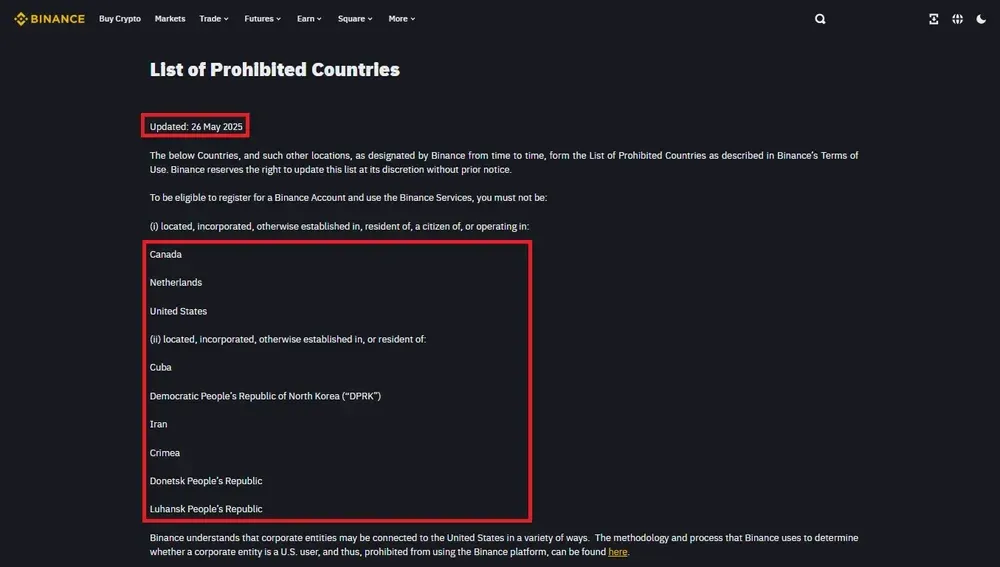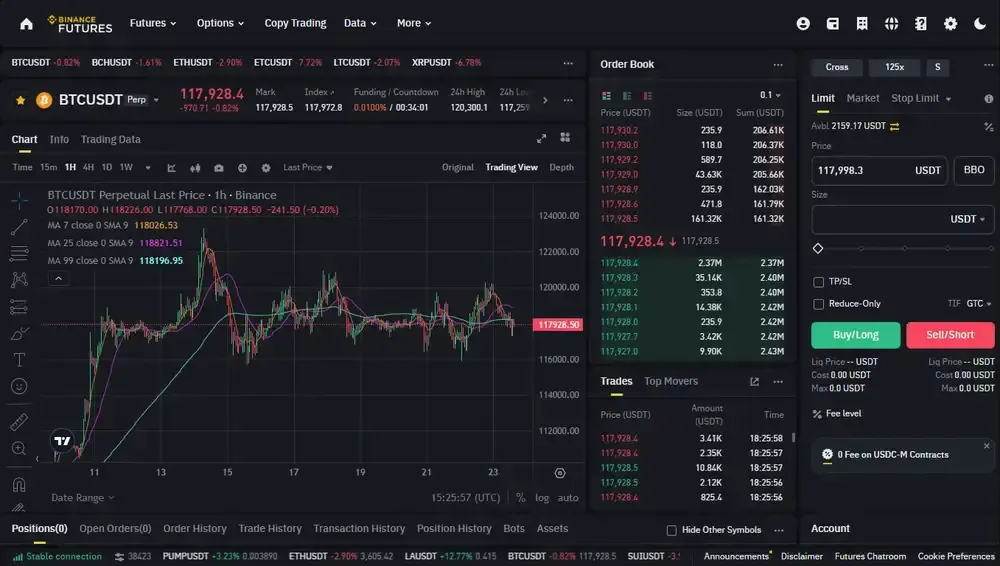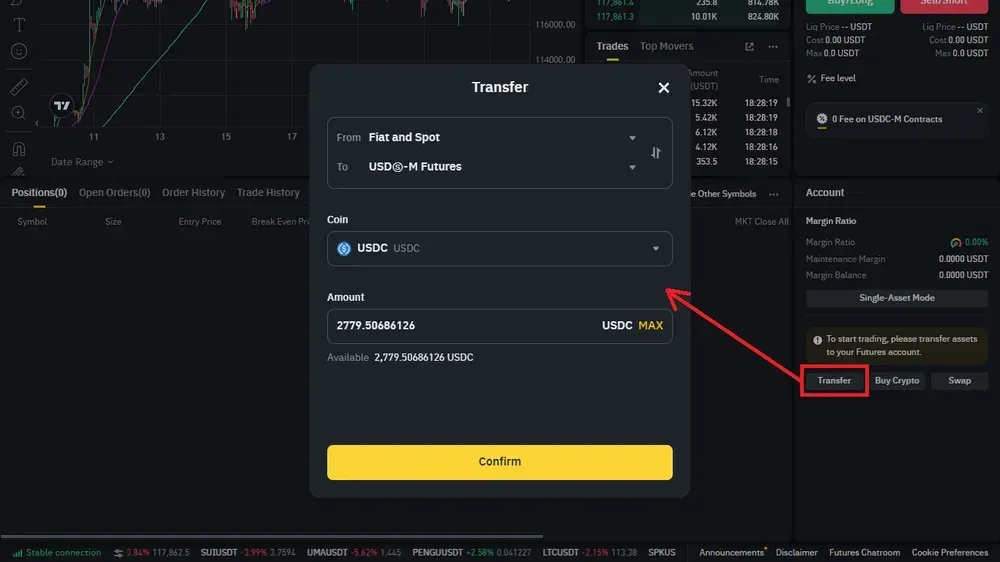- 24H Open Interest$120,222,794,390.69-0.66%
- 24h Liquidation$425,258,722.650%
- 24h long/short Ratio49.23% / 50.77%
- Fear & Greed Index21
- Bitcoin Price$82,717.30.19%
- Ethereum Price$2,626.59-3.93%
- Solana Price$114.63-0.62%
- XRP Price$1.68-3.84%
- 24H Open Interest$120,222,794,390.69-0.66%
- 24h Liquidation$425,258,722.650%
- 24h long/short Ratio49.23% / 50.77%
- Fear & Greed Index21
- Bitcoin Price$82,717.30.19%
- Ethereum Price$2,626.59-3.93%
- Solana Price$114.63-0.62%
- XRP Price$1.68-3.84%
Binance Futures Restricted Countries in 2025
Get clarity on Binance Futures restrictions by region, regulatory updates, and secure alternative platforms for unrestricted crypto futures trading.
Key Takeaways:
- Binance Futures restricts trading in jurisdictions including the USA, Canada, the Netherlands, and several sanctioned countries due to strict regulatory compliance requirements.
- Binance.US operates separately to comply with U.S. regulations and currently does not offer futures trading, though recent regulatory developments may signal potential changes.
- Traders in restricted regions can use alternative platforms like Coinbase, Bybit, OKX, Kraken, eToro, or the decentralized perps Hyperliquid for futures trading without geographic or KYC limitations.
Binance
Binance is the world’s largest exchange, founded in 2017, serving over 260 million users globally with more than $40 billion in daily trading volume across spot, futures, and options markets.
Features
Fees
Regulation
Overall Rating
If you’re here, you're probably frustrated or confused about why Binance Futures suddenly isn't available in your country anymore… we totally get it. It feels unfair to have something you've relied on for trading suddenly taken away without any clear explanation.
Let's talk through what's actually going on with these restrictions, so you can understand why this happened and explore some of the best alternative exchanges for your region.
List of Binance Futures Restricted Countries
Binance Futures restricts access based on regulations outlined in the Binance Futures Services Agreement, the main Terms of Use, and the List of Prohibited Countries.
Restricted countries include:
- United States: Futures trading prohibited due to regulations enforced by the Commodity Futures Trading Commission (CFTC), requiring specialized licensing and separate compliance.
- Canada: Operations ended in May 2023 following new securities regulations requiring crypto platforms to meet stricter registration and reporting procedures.
- Netherlands: Services discontinued in June 2023 after Dutch central bank (De Nederlandsche Bank, DNB) denied essential regulatory approval for continued operations.
- Cuba: Trading unavailable due to stringent economic sanctions imposed by the U.S. Treasury Department, restricting financial transactions involving Cuban nationals.
- Iran: Access restricted under international economic sanctions led by the U.S. Treasury Department and global authorities targeting financial interactions with Iranian entities.
- Democratic People's Republic of Korea (DPRK): Futures trading blocked due to sanctions from the United Nations Security Council aimed at limiting North Korea’s nuclear activities.
- Crimea, Donetsk, and Luhansk: Access denied in compliance with international sanctions imposed due to geopolitical conflicts and Russia’s involvement within these Ukrainian territories.
Furthermore, entities connected to the U.S. must complete the Assessment of Applying Entities with US Connections, which involves a detailed questionnaire assessing U.S. nexus, ownership structure, algorithmic trading activities, and investment fund status, to ensure compliance with U.S. regulators.

Countries and Currencies Supported by Binance Futures
Binance Futures supports traders from more than 180 countries (per the FAQ on the home page), providing multiple currency and payment options. Traders can deposit using supported cards and fiat currencies directly on the platform, with further details available on the Buy Crypto (Fiat/P2P) support page.
Supported countries and currencies include:
- Brazil: Supports Brazilian Real (BRL), allowing traders direct deposits through VISA, Mastercard, Apple Pay, or Google Pay for crypto purchases.
- Australia: Supports Australian Dollar (AUD), enabling crypto purchases through major payment methods including bank cards and Apple Pay.
- United Arab Emirates: Traders can transact directly in Emirati Dirham (AED) via supported card methods, including Apple Pay and Google Pay.
- Germany: Supported via Euro (EUR) deposits using SEPA bank transfers or direct card transactions through VISA, Mastercard, and mobile payment options.
- Mexico: Supports Mexican Peso (MXN), providing convenient deposits through VISA/Mastercard debit and credit cards, as well as mobile payment methods.
- South Africa: Offers deposits and transactions directly in South African Rand (ZAR), accessible through VISA, Mastercard, Google Pay, or Apple Pay.
- Japan: Japanese Yen (JPY) deposits supported through card transactions (VISA/Mastercard) and mobile payments, including Apple Pay.
- New Zealand: Supports New Zealand Dollar (NZD), providing straightforward crypto purchases via major card issuers and supported mobile payment methods.

How To Fund Your Binance Futures Account
To begin trading futures on Binance, you must first create and activate a Binance Futures account, then transfer funds from your existing Spot Wallet to your Futures Wallet.
Follow the steps below to fund your account on Binance Futures:
- Log Into Your Binance Account: Sign into your existing Binance account on the official website or the Binance mobile app using your email and password.
- Navigate to the Futures Section: From the homepage, select the (Futures) tab in the top navigation menu to access Binance's futures trading interface.
- Open Your Futures Account: Click (Open Account), select your trading experience level (Beginner, Experienced, or Advance), optionally enter a referral code, accept the Binance Futures Service Agreement, and click (Open Now).
- Go to the Transfer Option: Once your Futures account is activated, find the (Assets) widget at the bottom-right corner of your Futures interface and click (Transfer).
- Set Up Transfer Details: In the transfer window, set the direction from your (Fiat and Spot Wallet) to your (Futures Wallet), reversing if needed using the swap arrow.
- Choose the Cryptocurrency to Transfer: Select the cryptocurrency (e.g., USDT, Bitcoin, Ethereum) you wish to transfer from the available options.
- Complete the Fund Transfer: Enter the amount to transfer into your Futures Wallet, click (Confirm), and verify your transferred balance under (Assets).
Note: Binance USD-M Futures and COIN-M Futures wallets are separate; ensure you're transferring funds to the correct wallet corresponding to your intended trading type.

Can I Trade Binance Futures in the US?
Binance created Binance.US as a separate entity specifically to comply with United States regulatory requirements, operating independently from the global Binance platform. Binance.US currently offers spot trading and staking products, but it does not provide futures trading due to existing CFTC restrictions.
However, recent regulatory developments indicate potential changes. In May 2025, the SEC voluntarily dismissed its lawsuit against Binance, while in April 2025, the CFTC issued a request for public comments on perpetual exchanges, suggesting possible reconsideration of current rules.

Does Binance Require Mandatory KYC Verification?
Yes, Binance requires mandatory Know Your Customer (KYC) identity verification for all users before accessing trading, withdrawals, and deposits. This process involves submitting personal identification documents, completing a facial verification check, and sometimes providing proof of residence.
KYC verification helps Binance comply with global regulatory standards, prevent fraudulent activities, and secure user accounts. Users who do not complete this verification process face account restrictions, including severely limited withdrawal capabilities and inability to access trading products, including Binance Futures.

Can You Access Binance Futures with a VPN?
Technically, it's possible to access Binance Futures with a VPN, but based on user experiences and Binance's terms of service, using a VPN to bypass geographic restrictions can result in severe penalties, including account suspension or permanent closure.
Binance actively monitors and identifies VPN usage to enforce regulatory compliance, making it risky and inadvisable for traders to attempt this method.
Best Alternatives if Binance is Unavailable in Your Country
Instead of risking account suspension by using a VPN, consider reliable alternatives specifically suited for your geographic location. Below are recommended alternatives for futures trading across different regions:
- United States: Coinbase Futures just launched a fully regulated perpetual futures contracts platform compliant with U.S. CFTC standards, suitable for traders based in supported states.
- Europe: Bybit provides futures trading with extensive crypto derivatives options, deep liquidity, and availability in most European jurisdictions.
- Asia: OKX is widely accessible in Asian markets, supporting futures and perpetual contracts with diverse crypto assets and strong market liquidity.
- United Kingdom: Kraken Futures operates under FCA oversight, delivering fully compliant crypto futures trading services specifically for UK traders.
- Australia: eToro Australia allows traders access to regulated crypto derivatives and futures markets within ASIC's regulatory framework and consumer protections.
If you're looking beyond regional limits altogether, Hyperliquid is the leading global alternative, and our recommendation for a fully decentralized no KYC perpetual futures exchange.

Bottom Line
While restrictions on Binance Futures can feel discouraging at first, remember that the crypto world is vast and full of opportunities. Now that you're clearer about why these limits exist, you're ready to explore trustworthy, accessible alternatives that match your trading style and location.
Stay proactive, keep adapting, and you'll soon find the perfect exchange to continue your leveraged bets without missing the next big dip or pump.
Frequently asked questions
If Binance Futures restricts your country, you'll typically receive advance notice and a timeframe to close or transfer positions, after which positions may be automatically liquidated or closed at market price.
Yes, Binance generally informs users via email, platform notifications, or official announcements if their country faces new restrictions or service changes.
Yes, even if your region is restricted, Binance allows users to withdraw their funds from futures wallets to spot wallets, and subsequently off-platform, within specified timeframes.
Restrictions generally apply to both individual and corporate accounts, though corporations linked to restricted countries must complete additional compliance assessments to confirm eligibility.
Yes, if regulatory conditions improve or Binance meets local compliance requirements, previously restricted countries could regain access, though there's no guaranteed timeline.
.avif)